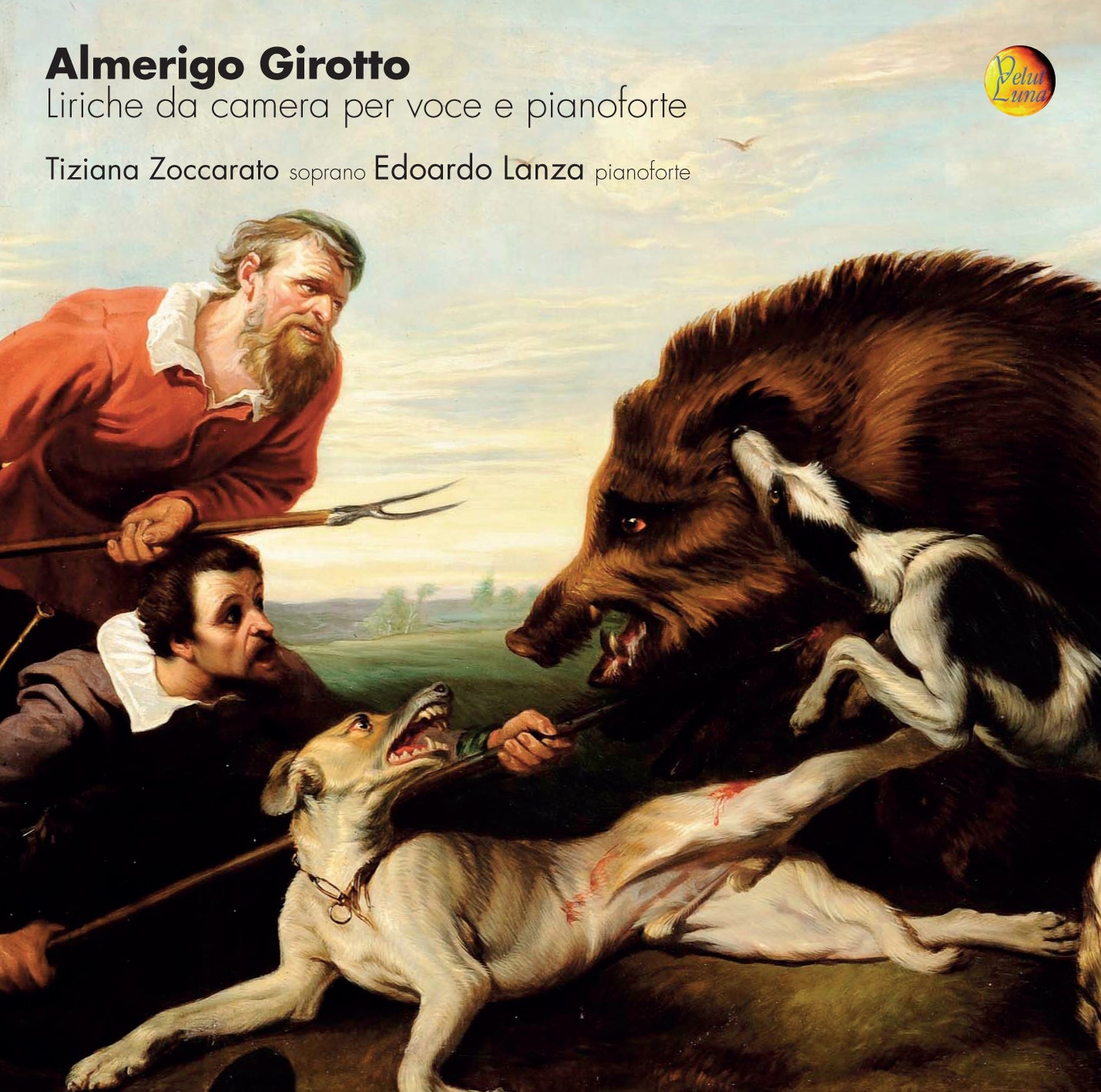Velut Luna
ALMERIGO GIROTTO, LIRICHE DA CAMERA PER VOCE E PIANOFORTE - Zoccarato, Lanza
ALMERIGO GIROTTO, LIRICHE DA CAMERA PER VOCE E PIANOFORTE - Zoccarato, Lanza
Genere musicale: Classica
Disponibile
Impossibile caricare la disponibilità di ritiro
ALMERIGO GIROTTO, LIRICHE DA CAMERA PER VOCE E PIANOFORTE (CVLD281)
Autore: Almerigo Girotto
Esecutore: Tiziana Zoccarato (soprano), Edoardo Lanza (pianoforte)
Disponibile in: File HD, CD
Tracce
Due Canzoni Veronesi su testi popolari
Conte Marin (6.53) / La Pastorela (4.27)
Quattro Suites su versi popolari veronesi
I Suite: Allemanda (2.31) / Siciliana (2.19) / Corrente (2.14)
II Suite: Preludio (3.23) / Fughetta (2.16) / Intermezzo (1.13) / Bagatella (1.39) / Ostinato (1.22)
III Suite: Mattinata (2.19) / Cantilena (1.42) / Finale (1.29)
IV Suite: Introduzione (2.27) / Pavana (2.32) / Gagliarda (2.02)
Trittico su versi di Neri Pozza
Epitaffio a Maria (3.08) / Nozze al plenilunio (3.33) / Togli dal volto le belle mani… (2.32)
24bit/88kHz original recording made at Area Magister Studio,
Preganziol, Italy on March 10th and June 1st, 2016
Edoardo Lanza plays Steinway & Sons D274 Concert Grand Piano
prepared and tuned by Silvano Zanta
Production: Velut Luna
Executive producer: Marco Lincetto
Musical producer: Edoardo Lanza, Tiziana Zoccarato
Recording, editing, mix and mastering: Marco Lincetto
Design: Limage
Photos: Marco Lincetto
English text: Patrizio Castelli
Note
ALMERIGO GIROTTO nacque cieco a S. Paolo de! Brasile, nel 1897, da genitori italiani emigrati, ma venne affidato sin dall'età di due anni alla nonna materna a Vicenza, Condotto a nove anni all'Istituto per i ciechi "L. Configliachi" di Padova, vi rimase fino al 1914 ricevendovi anche, sotto la guida di Luigi Bottazzo, una prima istruzione musicale (Armonia e Organo).
Nel 1941, sollecitato dalle insistenze degli amici, affrontò all'improvviso, in un'unica sessione, gli esami di Fuga e quelli di Composizione presso il "Pollini" di Padova, superandoli splendidamente e con estrema facilità. Importanti traguardi, questi raggiunti, ma privi di pratiche conseguenze, vanificati come furono dai suo carattere schivo e fatalmente rivolto ad un pessimismo integrale (non certo attenuato dalla pesante atmosfera bellica), che condizionava anzi non solo il successo delle sue opere ma persino la semplice conoscenza delle stesse.
Egli aveva voluto abitare quasi sempre a Vicenza, città alla quale lo legavano nostalgia ed affetti e quivi si svolse, nel dopoguerra, anche il resto della sua esistenza: una lunga attesa, un avvio dignitoso e cosciente verso il grande silenzio. Così tacque, nell'Aprile del 1967 1a sua voce d'uomo, mentre quella del canto s'era già spenta da molti anni.
Se la vita di Almerigo Girotto ebbe ne! tempo una durata normale, assai breve fu invece la stagione creativa, che sì svolse press'a poco nel quindicennio 1925-1940: una lenta maturazione, dunque, (che se è caratteristica di molti artisti, in lui si spiega piuttosto con le condizioni della sua vita) seguita dalla rinuncia completa (e questa è spiegata dalla sua psicologia).
Fra i molti pareri entuisiastici proposti dai critici suoi contemporanei, riportiamo qui simbolicamente quanto scritto da Franco Abbiati sul Corriere della Sera, all'indomani del concerto tenuto, da illustri interpreti, all'Angelicum nel 1947 (anno in cui Girotto fu anche presentato al veneziano Festival dl Musica Contemporanea): ''le sue opere per canto, per violino, per pianoforte mostrano una maturità spirituale e una logica costruttiva degna dei migliori compositori moderni. Il loro contenuto è sovente drammatico, il loro linguaggio sovente duro e violento, la loro tessitura si assottiglia fino ad espressioni caste, esili, dolcemente liriche…”
Considerazioni sulle Liriche per canto e pianoforte di A. Girotto
Ciò che è davvero notevole nelle composizioni di Almerigo Girotto, e in particolare nelle sue liriche, è l’ammirevole combinazione fra tradizione e modernità, rispettoso classicismo e personalissima originalità, salda tecnica compositiva e fresca spontaneità melodica, che riesce a rendere efficacemente anche il carattere popolaresco dei testi in dialetto veronese da lui musicati.
Pur mantenendo alla base un solido impianto tonale, Girotto gestisce con eleganza e disinvoltura combinazioni armoniche dense e dissonanti, a volte nettamente politonali, e fa uso di formule ritmiche ed effetti timbrici sempre vari, interessanti ed appropriati.
Share

-

Spedizioni prodotti fisici
Spedizioni gratuite in Europa (UE), a partire da 4 articoli - Richiedere quatozione per i costi di spedizione per i paesi non UE
-

Consegna prodotti digitali
La consegna dei prodotti digitali avverrà direttamente sul sito e riceverai anche una email con il link per il download dei file.
-

Scrivi una recensione
Qui sopra puoi scrivere una recensione sul prodotto che hai acquistato, saremo felici di conoscere la tua opinione.


